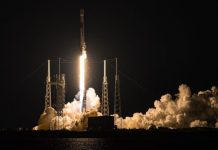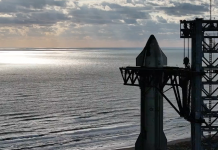“With this launch, SpaceX has completed its 61st launch in 2023, equaling last year’s record, and we still have four months left before the end of the year,” said SpaceX engineer Zachary Luppen during a livestream.
A Falcon 9 rocket with 13 spacecraft for the Space Development Agency (SDA) of the US Space Force was launched on September 2 from the Vandenberg Space Center in California and successfully landed at the spaceport. It was the 13th launch of the first stage of the rocket.
SpaceX initially attempted to launch the Tranche 0 mission on August 31 but was delayed due to problems with one of the nine engines on the rocket’s first stage. The second attempt took place on September 1 but was canceled 12 minutes before launch due to a valve problem in the ground equipment.
Saturday’s launch was the second under the Proliferated Warfighter Space Architecture (PWSA) program, a network of satellites deployed in low Earth orbit to provide military communications, missile warning, and tracking. The first PWSA launch took place in April when a Falcon 9 launched 10 satellites into orbit.
SpaceX launched 13 satellites and successfully landed a rocket

Tranche 0, consisting of 28 satellites, is the demonstration constellation of the PWSA program. Most satellites are designed for communications, but some are designed to detect missiles.
It was the 13th launch and landing for this particular first stage, and SpaceX’s 260th launch overall.
There is no information on when the satellites will start operating, as SpaceX has not provided details about this point. This is not surprising, since such missions related to government contracts and security often take place in conditions of limited information.
At the request of the contracting agency, SpaceX did not provide live video images from the Falcon 9 upper stage during launch and ceased broadcasting shortly after the first stage landed.




